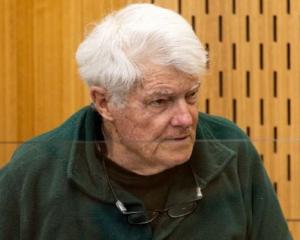"Neither of them are married - one of them has a partner, but the partner is also in the New Zealand Defence Force and is overseas. The other guy doesn't have a lot of family at all in New Zealand," he said.
The names of the two men killed had not been released because the Defence Force had been contacting the family of all 140 soldiers posted in Afghanistan to update them on the situation.
"We try to give the families some time to come to terms with the enormous grief they will suffer," Mr Key said.
He admitted Bamiyan was becoming more dangerous for New Zealand troops.
"It's a much more serious situation up in the north part of Bamiyan now. We lost Tim O'Donnell two years ago. There's greater fire power going in from the Taliban, they've got a new bomb maker and they are better resourced and have moved people up from the southern provinces," he said.
"It's a more dangerous, hostile environment for our guys."
The Taliban have reportedly claimed responsibility for the devastating ambush which killed two New Zealanders and injured six others.
The Miami Herald has quoted Taliban spokesman Zabihullah Mujahid as claiming that the militant group was behind the attack on members of New Zealand's Provincial Reconstruction Team (PRT).
Yesterday, Chief of Defence Force Lieutenant General Rhys Jones told media it was not thought the Taliban were responsible.
The attack in Afghanistan was the country's deadliest day in combat for more than forty years.
Six other New Zealanders were wounded - three seriously - when they went to the aid of Afghan police who were ambushed as they tried to arrest an insurgent.
But in spite of threats in the north-east corner of Bamiyan province where New Zealand's PRT is operating, Prime Minister John Key said yesterday that New Zealand troops "remain on track" to leave Afghanistan some time next year.
Four PRT patrol groups were called in to help Afghan National Directorate of Security (NDS) officers stabilise the situation and evacuate wounded near a village south of Do Abe late Saturday morning local time (7pm NZT).
The New Zealanders came under fire as they moved to secure high ground near a compound which had been taken by the Afghans.
One of the soldiers was killed instantly when an anti-tank rocket hit his armoured vehicle.
The other was on foot when he was hit by gunfire or shrapnel. He died in a helicopter on the way to hospital.
Three other soldiers were seriously injured and are expected to return to New Zealand, and a further three had moderate injuries.
Chief of Defence Force Lieutenant General Rhys Jones said the casualties occurred during "a two to three minute timeframe in that first burst of fire".
Two NDS members died and seven were wounded.
A group of about 17 insurgents carrying dead and wounded were seen leaving the area.
The slain New Zealanders are likely to be named today. They were part of the 19th rotation of PRT troops who arrived last October.
Their bodies are expected to be returned to New Zealand this week.
Relatives of other soldiers in Afghanistan went online yesterday to pay tribute to the men who died.
"I worry about my son every day, but I'm also proud that he is doing a job that ensures most Afghanis know there is humanity in the world," said the mother of one soldier.
Another said: "As a parent of a soldier in Afghanistan, you never stop worrying about them. On the other hand, extreme pride."
Seven New Zealand soldiers have been killed in Afghanistan since 2002, but Saturday's toll makes it New Zealand's worst day in combat since June 18 1970, when infantrymen Lance Corporal Cecil Richard Fisk and Private Leonard Cyril Jones were killed during the Vietnam war.
Mr Key said the loss of the two young men was "an enormous price to pay" as the PRT worked to bring stability to Bamiyan.
"My thoughts are with the family and friends of the two brave soldiers killed and also with the families and friends of those injured."
The Prime Minister said the increased risk in what was already the most dangerous part of Bamiyan province shouldn't alter New Zealand's commitment to keep the PRT in Afghanistan until next year.
"I don't think it argues the case we should stay longer but I don't think that the terrible loss we've suffered also argues we should leave earlier. I think we should just remain on track and continue to do the things we're doing."
Labour Party leader David Shearer, who previously worked for the United Nations in Afghanistan, said the deaths did not mean the PRT, deployed since 2003, should come home early.
"We've got a programme to withdraw over time, and I think that's probably the right way to go.
"Unfortunately it's a dangerous place to work. It's tragic that it's happened towards the end of our programme."
A journalist in Kabul said security in Bamiyan Province had been "deteriorating for quite a while".
"Particularly in the north east, that's where Do Abe is," he told the Herald last night. "That is the place where there's been all the trouble.
"It's a straight out inhospitable place."
He said the area was near where New Zealander Lieutenant Timothy O'Donnell was killed when insurgents ambushed his patrol in August 2010.
"Security in Bamiyan has been deteriorating for a long time. It's been the cause of a lot of concern ... the police commissioner in Bamiyan even called for more support and more assistance."
The family of Lieutenant O'Donnell marked the anniversary of his death on Friday.
Last night his father, Mark O'Donnell, told TVNZ: "It sounds like this happened on the 4th as well, so the 3rd and 4th August are going to be pretty sad times for a number of families now in New Zealand."
Peace activist and former Green MP Keith Locke said that last year, when the PRT handed over security duties in and around Bamiyan city, insurgent activity was low.
But it appeared they were now more active in the north-east of the province where the Taleban and other insurgents had a presence.
"New Zealand has got more involved in the active war, which wasn't like the original PRT mission , at a time when New Zealanders thought that after the departure of the SAS that we had got out of the war and just had this peacekeeping unit in Bamiyan province."











